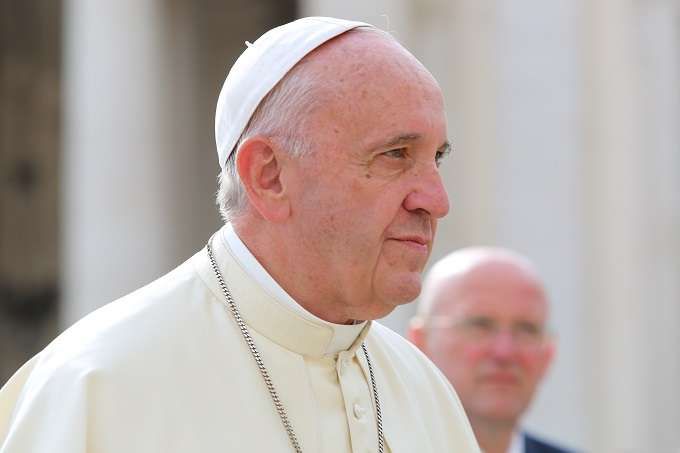Having dignified work is a topic Pope Francis has continuously returned to since his election, and it surfaced again in his latest prayer video, which urges viewers to spend October praying that employees have just working conditions, and for the unemployed.
The video, published Oct. 3, opens showing a young woman in an office searching through files and, when she can't find the one she is looking for, an older colleague comes over and helps her. As the scene plays out, Francis speaks in his native Spanish, saying “we should always remember the dignity and rights of those who work, condemn situations in which that dignity and those rights are violated, and help to ensure authentic progress by man and society.”
The video depicts various scenes of people working in inhumane conditions, before switching to show an unemployed man walking around the city handing out resumes. As he stands on the corner, a pizza delivery man he bumps into sees the folder of resumes and writes down the phone number of his company. In the next frame, the formerly-unemployed man is shown delivering a pizza to the woman who helped her younger colleague in the first scene, drawing a smiley face on her napkin when he sees that she is stressed out about her work.
Francis closes the video making an appeal to viewers, asking them to “pray that all workers may receive respect and protection of their rights, and that the unemployed may receive the opportunity to contribute to the common good.”
Launched as a special project for the Jubilee of Mercy, the videos are part of a larger initiative of the Jesuit-run global prayer network Apostleship of Prayer, and are filmed in collaboration with the Vatican Television Center (CTV) and the Argentinian marketing association La Machi.
The Apostleship of Prayer, which produces the monthly videos on the Pope’s intentions, was founded by Jesuit seminarians in France in 1884 to encourage Christians to serve God and others through prayer, particularly for the needs of the Church. Since the late 1800s, the organization has received a monthly, “universal” intention from the Pope.
In 1929, an additional missionary intention was added by the Holy Father, aimed at the faithful in particular. However, as of January, rather than including a missionary intention, Pope Francis decided to have only one prepared prayer intention — the universal intention featured in the prayer video — adding a second intention for an urgent or immediate need if one arises.
The prayer intentions typically highlight issues of importance not only for Pope Francis, but for the world, such as families, parishes, the environment, the poor and homeless, Christians who are persecuted and youth. Work is something that is especially important for Francis, and has been since his election.
Not only has he highlighted the dignity of work and the need for humane working conditions regularly in his speeches, but in nearly every trip he's taken within Italy he has met with the local working force. In his speeches, he typically advocates for a more just society with equal opportunity, for managers to be honest and to steer away from temptations of corruption, and for everyone to have the right to a fare wage.
He has also spoken out frequently on common problems in the working world that impact Italy specifically, condemning businesses that pay employees “under the table” with no set contract or benefits, or employers who only hire workers for 10-month contracts that don't include the summer months, so as to avoid paying them a full year's wage.
In his latest trip within Italy, which he made to the dioceses of Cesena and Bologna, the Pope again met with workers, unemployed persons and union representatives, telling them that to seek a more just society “is not a dream of the past but a commitment, a job that everyone needs today.”
We cannot grow accustomed to the number of unemployed people in our communities as if they are a mere number or a statistic, he said, but instead, we must help the poor and needy around us to find work, thus restoring their dignity. He said we must also dethrone the profit-mentality that often governs our intentions, instead placing the human person and the common good at the heart of what we do. But for this to happen, “it is necessary to increase the opportunities for decent work.”
“This is a task that belongs to the whole society,” he said. “At this stage in particular, the whole social body, in its various components, is called upon to make every effort, because work, which is the primary factor of dignity, is a central concern.”

